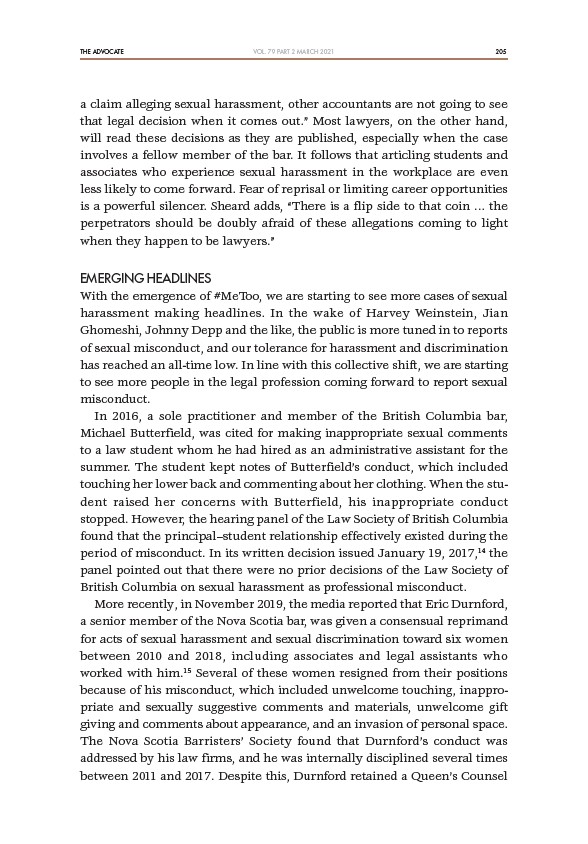
THE ADVOCATE 205
VOL. 79 PART 2 MARCH 2021
a claim alleging sexual harassment, other accountants are not going to see
that legal decision when it comes out.” Most lawyers, on the other hand,
will read these decisions as they are published, especially when the case
involves a fellow member of the bar. It follows that articling students and
associates who experience sexual harassment in the workplace are even
less likely to come forward. Fear of reprisal or limiting career opportunities
is a powerful silencer. Sheard adds, “There is a flip side to that coin … the
perpetrators should be doubly afraid of these allegations coming to light
when they happen to be lawyers.”
EMERGING HEADLINES
With the emergence of #MeToo, we are starting to see more cases of sexual
harassment making headlines. In the wake of Harvey Weinstein, Jian
Ghomeshi, Johnny Depp and the like, the public is more tuned in to reports
of sexual misconduct, and our tolerance for harassment and discrimination
has reached an all-time low. In line with this collective shift, we are starting
to see more people in the legal profession coming forward to report sexual
misconduct.
In 2016, a sole practitioner and member of the British Columbia bar,
Michael Butterfield, was cited for making inappropriate sexual comments
to a law student whom he had hired as an administrative assistant for the
summer. The student kept notes of Butterfield’s conduct, which included
touching her lower back and commenting about her clothing. When the student
raised her concerns with Butterfield, his inappropriate conduct
stopped. However, the hearing panel of the Law Society of British Columbia
found that the principal–student relationship effectively existed during the
period of misconduct. In its written decision issued January 19, 2017,14 the
panel pointed out that there were no prior decisions of the Law Society of
British Columbia on sexual harassment as professional misconduct.
More recently, in November 2019, the media reported that Eric Durnford,
a senior member of the Nova Scotia bar, was given a consensual reprimand
for acts of sexual harassment and sexual discrimination toward six women
between 2010 and 2018, including associates and legal assistants who
worked with him.15 Several of these women resigned from their positions
because of his misconduct, which included unwelcome touching, inappropriate
and sexually suggestive comments and materials, unwelcome gift
giving and comments about appearance, and an invasion of personal space.
The Nova Scotia Barristers’ Society found that Durnford’s conduct was
addressed by his law firms, and he was internally disciplined several times
between 2011 and 2017. Despite this, Durnford retained a Queen’s Counsel